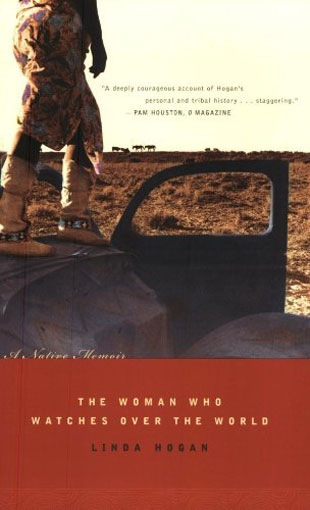Linda Hogan is the author of ten previous books including Dwellings and Power and has won a Lannan Foundation Award and a Guggenheim Fellowship. In this riveting memoir she raises up the value of self-telling and memory:
"Self-telling is rare for a Native Woman, but when I work on reservations with young people they want to know how I survived my life. I wish I could offer up a map and say ,'This way.' But it is not so easy. There are no roads through, no paths known, no maps or directions. The cairns and markers have been taken away and broken. Who knows where to step, how to find wholeness? It's not that we have lost the old ways and intelligences, but that we are lost from them. They are always here, patient, waiting for our return to their beauty, their integrity, their reverence for life. Until we do so, we will have restless spirits. . . .
" 'Memory is a field full of psychological ruins,' wrote French philosopher Gaston Bachelard. For some that may be true, but memory is also a field of healing that has the capacity to restore the world, not only for the one person who recollects, but for cultures as well. When a person says, 'I remember,' all things are possible."
These beautiful and discerning words point to the riches that unfold in Hogan's recounting of her pain-wracked life and her descriptions of the importance of storytelling, dreams, and the ancient ways of her Chickasaw relatives who carried heavy burdens of suffering and loss.
The author unflinchingly reveals an isolated childhood, her love affair at age twelve with an older man, her alcoholism, a harrowing battle with a debilitating physical condition, difficult times with two adopted daughters, a near fatal accident after falling from a runaway horse, and a lengthy recovery. Hogan tries to put into words her anguished feelings over the terrible treatment of her people in America, which reverberates in the consciousness of every Native American. In one sentence this poet catches so much: "Chief Joseph's skull became an ashtray for a dentist who bought it. Our fallen worlds, our anguish, became their curiosities and souvenirs."
Whether writing about the poignancy of dreams, the good Earth, animals, or Crazy Horse's connection with stones; Hogan's prose shines. Near the end of this memoir, she writes: "Fire, like pain, like love, is a power we do not know. Yet from the ashes of each, something will grow. No one knows if it will be something beautiful and strong. But in our lives, it is sometimes the broken vessel, as writer Andre Dubus calls it, that spills light." The Woman Who Watches Over the World: A Native Memoir by Linda Hogan spills lots of light.
